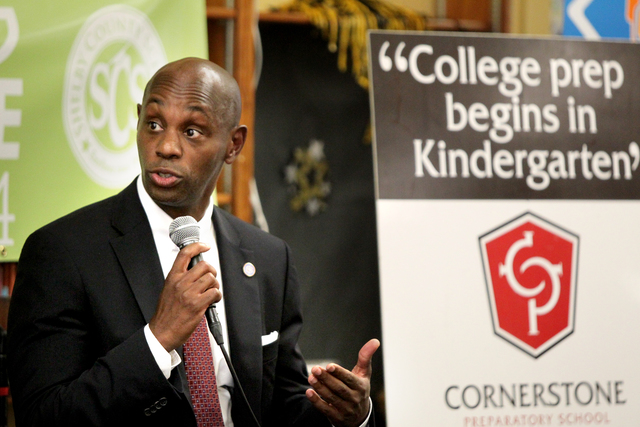Shelby County Schools Superintendent Dorsey Hopson has set audacious goals for this year’s second graders. He wants 80 percent of them to graduate “college and career-ready,” 90 percent overall to graduate, and 100 percent of those ready for college and careers to pursue higher education.
These are high hurdles for the educators of the school district. Today, only about six percent of Memphis seniors are considered “college ready” as defined by ACT scores and 40 percent of graduates don’t continue on to postsecondary education. To his credit, Superintendent Hopson is undaunted, saying that “vision without execution is hallucination” and that the entire district is being aligned to achieve its 80-90-100 goal.
The truth, however, is that years before the first students entered a classroom, the foundation of literacy and school readiness are being laid, and the effectiveness of that foundation greatly improves his chances for success in school. The second grade students targeted by Superintendent Hopson will graduate high school in 2025, and they are extremely familiar to us, because it was four years ago that we spotlighted them in our Class of 2025 presentation.
They were among the 15,167 children born in Shelby County in 2006, and the 7,825 children born into families living in poverty and dire poverty were more likely to be raised in single parent homes, less likely to attend high-quality preschools, less likely to be read to at least three times a week, more likely to lack early vocabulary development, and trailing behind their more affluent peers. It was predicted that 4,045 of them would drop out of high school, and that in a nutshell, is the challenge before Shelby County Schools, whose goal needs to reduce that number by almost two-thirds.
Literacy Is Risk Avoidance
In large measure, 80-90-100 success depends on strong literacy development during the first three years of a child’s life which researchers have linked to academic achievement, reduced grade retention, higher graduation rates, and more productivity as an adult.
Only a few decades ago people thought that reading began in the first grade because that’s when children were “ready.” But today, research proves conclusively that learning to read is the foundational skill for school success, because it is the precursors of understanding sounds, symbols, and meanings. As the National Research Council has said: “The majority of reading problems faced by today’s adolescents and adults are the result of problems that might have been avoided or resolved in early childhood years.”
By focusing on the importance of the first years of life, we give new meaning to activities and programs that contribute to literacy development, like early experiences and interactions with books, paper, and crayons, and with adults in their lives. Looking at that development as a dynamic process, it moves from an infant watching the pictures on the turning pages to a two-year-old turning the pages to the three-year-old telling the story (often a pretend story) as the pages are turned and to a five-year-old who can recognize letters and words.
Literacy Begins At Home
In this way, there is a direct line between vocabulary development and reading achievement and classroom achievement. In a home where parents have large vocabularies and where they engage children in conversations, children develop much larger vocabularies. Researchers have found dramatic differences in the size of the vocabularies of children even as young as three years of age that are the result of differences in the language environment in their early lives, and these differences strongly influence their cognitive scores when they reach school and their likelihood of becoming early readers.
The research is clear that a child born into a family of readers enjoys an advantage when it comes to learning to read. When adults read for fun, when they read aloud to their children, when they keep books and magazines at home, and when they take their children to the library, their children are more likely to have an easier time learning to read. For one in three families in Memphis, however, reading is a challenge for parents, and they are much less likely to read with young children.
As we support the success of the 80-90-100 plan for the Class of 2025, it’s even more important that for future classes of students, we advocate and support early childhood literacy development to give them their best opportunities for success.
This was previously posted as The Urban Child Institute’s Perceptions, commentaries emailed twice monthly by the local think tank. To sign up, go to home page here.



